|
|
|
Sort Order |
|
|
|
Items / Page
|
|
|
|
|
|
|
| Srl | Item |
| 1 |
ID:
107666


|
|
|
|
|
| Publication |
2011.
|
| Summary/Abstract |
In this article the authors examine two set of issues that constrain contemporary peace support operations (PSOs): one centered on the kinds of knowledge prevalent in PSOs and the second involving the organizational structures that characterize them. The authors' aim is to show the deep discursive and structural limitations and contradictions that continue to characterize the actions of armed forces and the dominance of militaristic thinking within PSOs. This article centers on multidimensional peacekeeping marked by emphasizing two main points in regard to the complex nature of such peacekeeping. First, Western military thinking is still dominant in the professional discourse of peacekeeping despite the fact that in many cases it is less relevant to the arenas where it is applied (in weakened or failed states). Second, forces in second-generation peacekeeping missions are by definition a form of hybrid organizations, and therefore conceptual changes in regard to PSOs not only involve the realm of knowledge but also entail practical consequences for the very organizational means used to achieve their aims. The authors' analysis demonstrates the blending, hybridization, and linkages that are an essential part of PSOs as processes that carry both advantages and disadvantages for organizational action.
|
|
|
|
|
|
|
|
|
|
|
|
|
|
|
|
| 2 |
ID:
188175
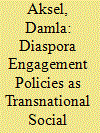

|
|
|
|
|
| Summary/Abstract |
In examining the transformations in statecraft, the existing scholarship on Turkish diaspora policies largely adopts Foucault’s governmentality perspective and suggests that the shifting policies reflect the home states’ attempt to assert control over citizens, not through coercion but rather through consent. While this framing has proved workable, it provides limited room for students of diaspora studies to incorporate the overall conceptualization on the resistance in which the non-resident citizens and countries of residence engage vis-à-vis home country politics and the potential failures of these policies. I propose to follow James Scott’s legibility framework to emphasize that the home states’ evolving policies to engage with non-resident citizens is a social engineering project, aiming to facilitate the state’s ability to monitor and mold the behavior of mobile populations in the context of neoliberal globalization. I argue that the legibility framework allows us to analyze not only the standardization processes, but also the resistance against it both from the migrants and from their countries of residence. To make my argument, I employ the framework to the case of Turkey, which has received considerable attention since the mid-2010s. This article is based on archival research of Turkish state documents on emigration, empirical research conducted between 2013 and 2014 involving nearly 100 interviewees including Turkish state officials in Turkey and with migrant representatives in France and the United States, and further examination of secondary resources, including informal talks with policy makers and diaspora representatives in the post-2016 period.
|
|
|
|
|
|
|
|
|
|
|
|
|
|
|
|
| 3 |
ID:
129200


|
|
|
|
|
| Publication |
2014.
|
| Summary/Abstract |
Kivalina is an Inupiat village of 350 people that sits on two square miles of doomed Alaskan coastline. the state of Alaska and the US government consider Kivalina imminently threatened by climate driven erosion and flooding, and the village must relocate very soon so service. every year, Kivalina is battered by hurricane strength storm system twice the size of Texas that threaten to wash the tiny village away.
|
|
|
|
|
|
|
|
|
|
|
|
|
|
|
|
| 4 |
ID:
098368
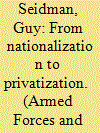

|
|
|
|
|
| Publication |
2010.
|
| Summary/Abstract |
In recent years the use of private military contractors to execute national security tasks in the U.S. military has finally come under public scrutiny. The main policy question is in three parts: What is the proper division of labor between the public and private sectors? Who decides which sector performs a specific task? If private operatives perform tasks that typically fall on the public side (combat, interrogation), what is the public oversight over the private actors, and how can they be held accountable for wrongdoings? In this article these questions are addressed in relation to the privatization process in the Israeli Defense Forces (IDF). The article has four parts: the first suggests that the Israeli baseline is unique as the IDF has historically been entrusted with a wide array of national-civilian missions; the second explains the economic realities that probably lie behind the privatization efforts; the third describes the slow and cautious privatization process currently under way; the fourth suggests that while there is little public debate, there is civilian oversight, there are some publicly exposed rationales, and there is public support in letting the IDF, the most trusted part of the executive branch, control the process.
|
|
|
|
|
|
|
|
|
|
|
|
|
|
|
|
| 5 |
ID:
092207
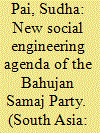

|
|
|
|
|
| Publication |
2009.
|
| Summary/Abstract |
The 'Dalit question',1 that is, the removal of discrimination, socio-economic improvement and share in political power for the lower castes, has always been at the centre of Indian politics. But recently we have witnessed the rise of Dalit parties/movements such as the Republican Party of India, the Dalit Panthers and smaller formations in different parts of the country. This Dalit assertion, first witnessed in the North Indian plains in the 1980s, has been one of the major challenges to Indian democracy in recent years. It has a qualitatively new character and distinct features which have significant implications for both democracy and development.
|
|
|
|
|
|
|
|
|
|
|
|
|
|
|
|
| 6 |
ID:
164713


|
|
|
|
|
| Summary/Abstract |
Vietnam has a long tradition of social engineering through which the ordering of urban space has effectively been used to enforce the state's vision of political and social order. With the country currently in transition from a centrally planned to a market‐oriented economy, the ordering of urban spaces is currently all the more important. This is prominently manifested in the numerous beautification projects that are being implemented in Vietnamese cities. This article explores recent ordering endeavours and considers the way they are legitimated and contested in Vietnam's new socio‐political context. Three beautification projects in Hanoi are examined using materials from policy documents, professional journals and media coverage. The article argues that state ordering actions and the ‘exemplary’ urban spaces they seek to create are embodiments of a complex system of orders of powers in transitional Vietnam, in which political visions of modernist socialism and the new market‐oriented agenda are sometimes in alignment and sometimes clash. Overall, the state's failure in sustaining these ‘exemplary’ urban spaces is emblematic of this hybrid system.
|
|
|
|
|
|
|
|
|
|
|
|
|
|
|
|
| 7 |
ID:
067305
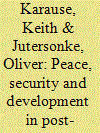

|
|
|
| 8 |
ID:
185983
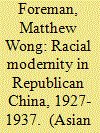

|
|
|
|
|
| Summary/Abstract |
This article locates the moment in Chinese history when ethnicity became a subject of scientific concern and an object of social engineering. Specifically, it examines how Han Chinese academicians during the Nanjing decade (1927–37) argued for the necessity of social engineering by appealing to race science. Focusing on a debate between the eugenicist Pan Guangdan and the anthropologist Wu Zelin, it argues that the Nanjing decade witnessed a key moment of ideological convergence in the physical and social sciences. Academicians concerned with national and racial salvation believed in awakening the Chinese population’s racial consciousness, which could only be achieved through rigorous social engineering. To justify the state’s homogenizing claims over ethnic minorities, they appealed to the doctrine of racial homogeneity, capitalized on the increasing cultural authority of scientific empiricism to recruit political allies to their cause, and endeavored to embed the ‘fact’ of ‘race’ from specialized disciplines to political institutions.
|
|
|
|
|
|
|
|
|
|
|
|
|
|
|
|
| 9 |
ID:
188335
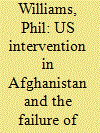

|
|
|
|
|
| Summary/Abstract |
Several factors militated against successful counterinsurgency in Afghanistan, but the real failure was a failure of governance. The US and its allies created a central government which proved extremely powerful at resource extraction while dismally weak at service provision, Development aid, the opium economy and the lack of political accountability created new forms of highly pernicious corruption, akin to those in many African states. The result was that legitimacy of the Afghan government was eroded, thereby setting the scene for a Taliban victory. The article concludes with three lessons from Afghanistan for the future.
|
|
|
|
|
|
|
|
|
|
|
|
|
|
|
|
|
|
|
|
|